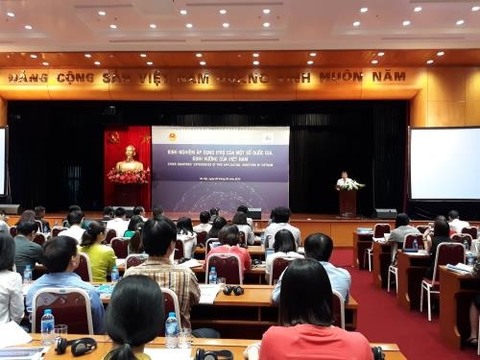
Viet Nam is expected to adopt International Financial Reporting Standards (IFRS), replacing the current Vietnamese accounting standards (VAS), by 2020. — Photo Duong Nguyen
Viet Nam is expected to adopt International Financial Reporting Standards (IFRS), replacing the current Vietnamese accounting standards (VAS), by 2020 as part of its efforts to improve transparency, according to experts at a seminar held in Ha Noi on Monday.
The event themed: “Experience in applying IFRS in some countries and roadmap for adoption in Viet Nam,” was co-organised by the Japan International Cooperation Agency (JICA) in collaboration with the Ministry of Finance (MoF) to share experiences on the application of IFRS standards in countries such as Japan, South Korea, the US, Malaysia and China.
Over the past 10 years, Viet Nam has established 26 accounting standards, but now these standards have disadvantages when compared to IFRS, and may create barriers and reduce confidence among foreign investors, said Director of the Accounting and Auditing Policies Department under the Ministry of Finance Vu Duc Chinh.
Chinh said businesses’ financial statements under VAS standards cannot accurately reflect the value of assets and liabilities, so the application of the international accounting system is crucial and inevitable.
“However, it is a tough task to apply international standards in Viet Nam because we have many different types of enterprises,” Chinh said.
According to Chinh, after approval by the Government, the MoF will translate IFRS into Vietnamese so that local firms can accurately and fully understand the contents of the new financial reporting norms.
Trinh Duc Vinh, deputy director of the MoF’s Accounting and Auditing Policies Department, said that the goals of applying IFRS in Viet Nam are to overcome the limitations of VAS, improve the legal framework for accounting, improve the transparency of financial information, enhance accountability of enterprises and help Vietnamese businesses access capital sources and become listed on the international market.
Regarding the roadmap for Viet Nam, participants agreed that during 2018-20, 10 to 20 simple IFRS standards will be selected to be implemented, and officially applied to all the firms listed on the stock market from 2020. All other businesses that wish to apply IFRS and find that the application is possible are also encouraged to do so.
Sharing experiences of some countries in the world, Sekiguchi Tomokazu, a representative from audit company KPMG in Viet Nam, said that the roadmap for the application of IFRS of each country differs depending on the actual situation of that country.
In Korea, all listed companies, financial institutions, state-owned enterprises and other public interest entities are subject to the mandatory application of IFRS from 2011, he said.
Meanwhile, in China, firms are still required to apply the Chinese national accounting standards, so there are no specific rules for applying IFRS, Tomokazu added.
A representative of JICA said that the application of IFRS is very important. In Viet Nam, JICA can provide financial and technical support, facilitate the exchange of experiences on applying IFRS in Japan and help strike a balance between the application of IFRS and the national accounting system. — VNS